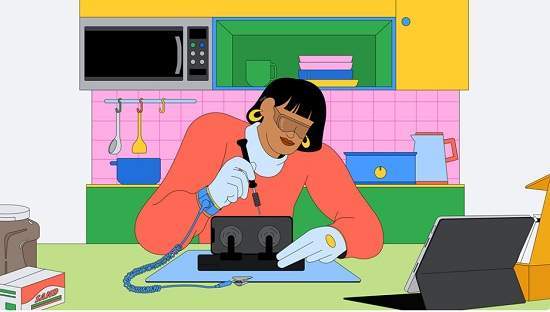When you purchase a product, regardless of whether a frame
for a picture of you and your family or a gadget that you
have been eyeing for the last couple of months, you would assume that
once the transaction is completed, you rightfully own the item that is now in
your possession.
اضافة اعلان
While most may believe that this is a given, reality has
strayed far from its logical conclusion.
The concept of ownership — the forfeiting of consumer rights
— has been brought to the fore in the smartphone consumer market this last year
because Apple battled the "Right to Repair Act" to prevent
individuals, or non-Apple-affiliated repair shops, from performing any type of
maintenance on their phones without Apple's general approval.
While under normal circumstances this could be
understandable to some degree, Apple had the insight not just to make it
incredibly difficult to have their devices repaired at independent shops but to
also have obscene prices for fixes that generally would not warrant such price
tags.
There have been numerous controversies over such Apple practices
for a long time. The most recent discovery is that unless you fix your iPhone 13
screen at an official Genius Bar or an Apple-certified repair center, your
screen will refuse to operate as usual due to specific hardware locks.
Therein lies the Right to Repair Act — the hardware-specific
locks that only Apple can lift have caused a significant disturbance in the
Apple community, enough to even convince the most fanatical users that the tech
giant has taken it too far.
Consequently, a bill was passed in recent months that
ordered Apple to improve its users’ smartphone ownership rights significantly.
After all, if you purchased your smartphone, you should be
able to repair it wherever you please, not just at a Genius Bar.
Whether it is due to the scale of negative PR headed its way
or through governmental pressure that it could no longer lobby hard enough to
make it go away, Apple caved in – and has finally started making strides in the
right direction.
Announced in early November, the self-service repair kit
will enable users to purchase screens, batteries, cameras and all the tools
necessary to repair their devices directly from Apple.
Amidst the grand
news, a shadow lurks in the background
The self-service repair kit is most definitely a welcome
addition to those that enjoy working on their own devices or those attempting
to be a bit more frugal with their expenses. However, as the details have not
been entirely released on the pricing of this product, many concerns are still
present.
For starters, Apple had caved once before, deciding that batteries
and screens would be sold to non-affiliated shops for a slight markup. While this
was fantastic news and Apple made sure to market it as such, many failed to
read the fine print.
 (Photo: Wired)
(Photo: Wired)
The fine print stated that shops would have to file orders
to Apple for these screens, and during filing, the phone's model had to be
inputted into the order field. The order would then take up to five weeks to
get approved and then several days to ship.
What this meant is that independent shops, even after the
bill has passed, were still unable to fix their customers’ devices – because it
is nonsensical, from a consumer point of view, to wait for upwards of six weeks
for a screen or battery replacement.
However, this was quickly swept under the rug, minimal
outrage was sparked, and the entire ordeal was quickly forgotten.
Consumers went ahead thinking that stores now used genuine
parts, and Apple got away scot free maintaining its highly profitable operations.
At the same time, shops were still disgruntled because they had to scour the
ends of the earth for Apple components.
Therefore, before any praise is made for Apple's grand
decision to sell its parts to the public, it is best to sit this one out and
wait until all news is officially available, on its pricing, order requirements
and any fine print shenanigans.
The long haul ahead
Apple has had several PR nightmares over the last several
years, namely its battery obsolescence through iOS updates, its continuous
mismanagement, deceit in terms of repairs and its continuous lobbying of big
government to put the company's interests ahead of the consumers’.
While the breakthrough is most definitely to be commended,
it is crucial to keep in mind that to get access to these screens and
batteries, Apple had to be forced by the highest levels of government to stop
strategically locking its users within Apple's ecosystem.
The key takeaway is that we are still a long way from having
absolute control over what we purchase. Due to this being a growing trend in
the tech industry, it is vital to stay vigilant and explore all potential
outcomes when purchasing a product.
The right to repair should not apply to smartphones alone;
car manufacturers such as Tesla, which is loved by almost all around the world,
are pulling similar tactics regarding their car repairs.
Whether we will eventually return to the land of
self-ownership is unknown. However, consumers worldwide must continue to point
out such obviously menacing practices to prevent enterprises around the world
from leveraging the uninformed nature of the public.
Read more Technology





